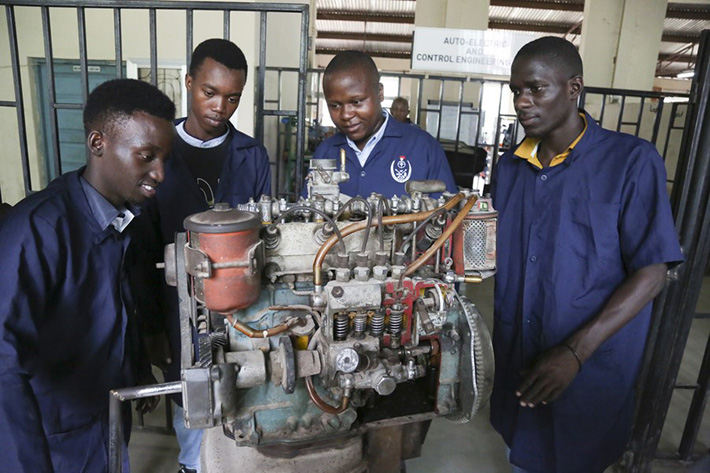|
||||||||||
| Home Nation World Business Opinion Lifestyle ChinAfrica Multimedia Columnists Documents Special Reports |
|
||||||||||
| Home Nation World Business Opinion Lifestyle ChinAfrica Multimedia Columnists Documents Special Reports |
| ChinAfrica |
| Educational Enrichment |
| China’s Luban Workshops introduce technical and vocational training for automotive talents in Tanzania |
| By Derrick Silimina | VOL. 15 July 2023 ·2023-06-25 |

Students learn vocational skills in the Luban Workshop in Dar es Salaam, Tanzania, on 20 March (XINHUA)
Abdullahi Okelo in Dar es Salaam in Tanzania tries to fully concentrate as he holds his tool, keen to start his practical work on automobile engine assembly before his tutors’ final assessment. Okelo’s dedication is driven by his deep passion for mechanical engineering and years of struggle to develop his engineering skills in a bid to earn a living.
“I am thrilled to be a student at the Luban Workshop, especially to be taught by the best tutors. This is a dream come true and I endeavour to try my very best to realise my goals,” Okelo, who is studying mechanical engineering, told ChinAfrica.
Just like Okelo, Charles Taqwa, a 29-year-old locomotive engineering student from Dar es Salaam is also excited to be part of the programme. “The Luban Workshop is a game changer in my career and I am excited to pursue locomotive technology studies. I am hopeful of getting a job in the standard gauge railway.”
According to the Association for the Development of Education in Africa (ADEA), at least 475 million new jobs must be created on the continent in the coming decade to absorb the 73 million young people currently unemployed and the 40 million new workers entering the job market each year.
For this reason, China’s Zibo Vocational Institute (ZBVI) and Tanzania’s National Institute of Transport (NIT) recently launched the first batch of the Luban Workshop training programmes to equip Tanzanian students at the NIT with the knowledge of automobile assembly and overhaul technologies as well as Chinese language skills.
Skills training
In line with the UN’s Agenda 2030, the African Union’s Agenda 2063 and the Continental Education Strategy for Africa (CESA 2016-2025) focus on the development of technical and vocational skills, specifically in terms of access to high-quality technical and vocational education and training for jobs and entrepreneurship.
The Luban Workshop programme has been designed to introduce high-quality education and teaching resources for Tanzania’s automotive engineering and other related majors, and to cultivate professionals proficient in automotive engineering.
As a part of the China-Tanzania cooperation under the framework of the Forum on China-Africa Cooperation, the Luban Workshop programme aims to enhance Tanzanian youth’s competence in the job market.
The Luban Workshop project was introduced at the NIT in October 2022 to both teachers and students. The Luban Workshop has attracted over 30 students, mostly those engaged in automobile engineering and locomotive technology studies.
Faraja Nyangassa, lecturer in automobile engineering at the NIT, recently said that the Luban Workshop is unique compared to other traditional workshops in that the Luban Workshop is more practical and deals with the assembly and disassembly of modern vehicles.
Speaking during the launch of the first batch of a joint training programme, Zacharia Mganilwa, rector of the NIT, said that the institute’s automotive students will now be able to correctly master the assembly, inspection and debugging methods for automobiles as well as be able to maintain automobiles correctly.
“Students will be equipped with hands-on skills before graduation and be able to read assembly drawings. Students who will complete this programme will be able to repair automobile electrical and mechanical system and automobile electronic control systems,” Mganilwa said.
Sun Qiyou, president of the ZBVI, said, “We have made overall preparations such as allocation of teachers, design of curriculum, and many other aspects. We have formulated a training programme tailored for needs of the students, including several teaching seminars to discuss the teaching methods, teaching content, and other details.”

Attendees participate in the launch of a joint Luban Workshop training programme held via Zoom at the institute in Dar es Salaam, Tanzania, on 28 February (NIT)
China’s support
According to China’s Ministry of Education, the Luban Workshop has become a symbol of Chinese vocational education exchanges and cooperation in the world. To date, 27 Luban Workshops have been established in countries along the Belt and Road, with Tianjin’s vocational colleges taking the lead, setting up 21 workshops in 20 countries. China has further established a total of 12 Luban Workshops in 11 African countries, including Kenya, South Africa, Nigeria, Egypt, Côte d’Ivoire, and Ethiopia.
Certainly, the Luban Workshop has filled a gap in vocational education cooperation between China and Africa.
The World Economic Forum estimates that 15 million to 20 million young people will join the African workforce every year for the next two decades. By 2030, Africa will be home to more than a quarter of the world’s population under 25, which will make up 60 percent of the continent’s total population. By then, 15 percent of the world’s working-age population will be in Africa, and the continent’s urban population will exceed 700 million.
That is why laying a foundation for the training of the continent’s current and future workforce requires a comprehensive policy approach, including private sector commitment and institutional reforms.
John Mahona, head of the Department of Transport Engineering and Technology at the NIT, recently disclosed that the courses offered at the workshop are designed to produce graduates who can match the needs of employers as well as entrepreneurship in the 21st century, and are ready to take up engineering jobs.
That is why some local informal automotive engineers plying their skills in Dar es Salaam’s makeshift garages are thrilled with the introduction of the Luban Workshop programmes in their area.
At 20, Josphat Adjiambo is one of the youngest auto engineers based at Kariako within Dar es Salaam’s central business district where he became a “spannerman” or tools handler to earn a living, thanks to his passion for automotive engineering.
|
||||
| About Us | Contact Us | Advertise with Us | Subscribe |
| Copyright Beijing Review All rights reserved 京ICP备08005356号-5 京公网安备110102005860号 |